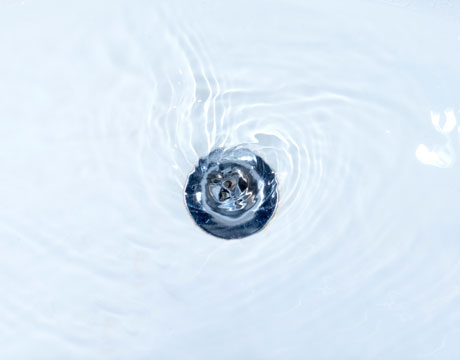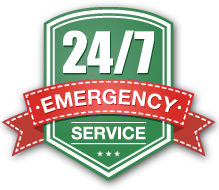
Seeking a rapid solution for a clogged drain? Our easy-to-follow instructions will teach you how to clear drain blockages using common household items. Bid farewell to pesky clogs and embrace swift, DIY fixes that are effective.
Common Causes of Drain Clogs
Are you puzzled by the frequent clogging of your kitchen sink drain? Many share this annoyance. Often, the blockages are due to:
- • Hair that builds up over time and weaves into a blockade obstructing water flow
- • Grease, oils, or fats poured down sinks can lead to significant accumulations that cause blockages.
- • Food remnants, such as tough fibers from vegetables such as celery or swollen pasta, should be disposed of in trash cans rather than garbage disposals to avoid congesting your kitchen sink.
- • Non-biodegradable items may damage your garbage disposal unit and are notorious for causing obstructions.
So, what steps can be taken with this understanding of common causes behind clogged drains? Preventative measures include proper waste disposal habits and diligent maintenance routines. Being vigilant about what is allowed down our sinks and consistently cleaning them prevents the formation of pesky clogs.
DIY Methods for Unclogging Drains
Before you call a plumber, consider attempting to unclog your drains using do-it-yourself techniques. Many of these strategies can be quite successful and utilize common household items. Options for tackling blockages include using a plunger, creating a mixture of baking soda and vinegar, or conducting a hot water flush.
Let’s explore each strategy in greater detail.
Plunger Power
The unassuming plunger stands as a formidable force in the battle against clogs. This device, equipped with a flexible rubber end shaped like a bell or cone and attached to an operating handle, is especially effective at dislodging blockages in:
- • Toilets
- • Kitchen sinks
- • Bathtubs
- • Showers
Due to their specific design, bathroom sinks might be less efficient, which underscores the importance of selecting an appropriate sink for your restroom.
When deploying a plunger for optimal results, adhere to these instructions:
- • Protective waterproof gloves and safety glasses are needed first.
- • Firmly position the rubber part of the plunger over the drain’s opening.
- • Vigorously yank upwards.
- • Execute this plunging action repeatedly until you break up and clear out any obstruction.
Harnessing such simple yet decisive ‘plunger prowess,’ coupled with removing plugs from shower drains if necessary, can often restore smooth flow through previously blocked drains.
Baking Soda and Vinegar Magic
Should the plunger fail to unclog your drain, consider employing a natural solution using baking soda and vinegar—two readily available household ingredients that have proven effective against clogs. Once mixed, these substances—sodium bicarbonate (commonly known as baking soda) and acetic acid (found in white vinegar)—undergo a chemical reaction that can disintegrate blockages.
To deploy this method, combine half a cup of baking soda with an equal amount of white vinegar or mix one full cup each of baking soda, water, and vinegar. Pour the resulting blend down the afflicted drain. It’s advisable to cover the drain for 5 to 10 minutes following application to augment the chemical interaction aimed at dissolving clogs. This approach yields results and is gentler than traditional abrasive chemical cleaners designed for clearing drains.
Hot Water Flush
Attempting a hot water flush as the last do-it-yourself strategy can be particularly beneficial for clearing kitchen sink drains. Boiling water represents the most cost-effective and straightforward approach to resolving clogs in sinks, especially those in the kitchen area. Consistently allowing hot water to flow through your drain after each use is an excellent preventive measure that helps wash away small remnants of food before they have a chance to create blockages.
To execute this method, pour boiling hot water directly into the drain. Immediately follow up with a steady stream of additional hot tap water for effective flushing action. When grease is responsible for the clog, adding vinegar to boiling water can help dissolve these fatty deposits. Applying vigorous plunger action may fully dislodge them.
Keeping up with regular applications of a scalding-hot-water rinse will maintain clear passages within your plumbing system, promoting consistent and unimpeded drainage performance.
Advanced Techniques for Tough Clogs
If the clog remains unyielding despite your best efforts with do-it-yourself methods, don’t lose hope. Sometimes, a blockage is particularly obstinate and requires more robust measures. These more potent solutions range from employing a drain snake to hydrojetting or even enlisting the expertise of professional plumbers for those exceptionally resistant cases.
We shall delve deeper into these sophisticated methods. A drain snake can be instrumental in dislodging tough clogs that simpler tactics fail to resolve.
Drain Snake (Auger)
A drain snake or auger can transform the process of confronting a stubborn clog. This hand-operated device features a drum containing a coiled, flexible metal cable that can delve deep into the drain pipe to make contact with the obstruction.
As soon as the drain snake engages the clog, you gradually wind back the cable into its drum, thus pulling out the blockage attached to its end. This technique is exceptionally useful for obstructions positioned too far down for plungers or mixes of baking soda and vinegar to affect.
Hydro Jetting
Hydro jetting is an advanced and efficient technique for addressing tough clogs in drain pipes. It involves using water at pressures as high as 4000 psi. The intense force can remove a range of blockages within the pipes, such as silt, sand, hair, tree roots, and even substantial accumulations of grease—all without resorting to harmful chemicals.
Despite its efficacy, it’s important to note that due to the dangers posed by the power involved in this method. It should only be undertaken by trained professionals who understand how to safely harness such high-pressure levels.
When using hydro jetting services to clean drains or eliminate obstructions, qualified plumbers begin with a diagnostic procedure involving video camera inspection before any actual cleaning occurs. This step ensures they pinpoint any clog’s exact location and nature while evaluating overall pipe condition before initiating their work with hydro jets.
Calling in the Professionals
When you’re faced with a stubborn drain clog that refuses to clear despite your best efforts at home, it might be time to seek expert help. Suppose the risk of inflicting damage on the pipes is high due to aggressive chemical cleaners. In that case, getting in touch with skilled plumbers becomes imperative. Albuquerque Plumbing, Heating & Cooling offers specialized services for these situations – equipped not only for plumbing but also for residential and commercial issues in and around the broader Albuquerque region – while ensuring their team can respond any hour of any day.
This esteemed company has earned an A+ rating from the Better Business Bureau and multiple accolades, such as the Angie’s List Super Service award for its exemplary service standards. Thus, when all other attempts have failed, and your drains remain obstructed, calling professionals should be considered your safest option. To contact Albuquerque Plumbing, Heating & Cooling directly about a persistent clogged drain or related problems, dial 505-349-4404 anytime.
Preventing Future Drain Clogs
After discussing methods for unclogging drains, it’s essential to focus on averting potential future blockages. Indeed, stopping clogs from occurring is preferable to dealing with them after the fact.
To stop drain clogs before they start, ensure you dispose of waste correctly, maintain your drains consistently, and fit drain screens that can intercept debris before its descent into the drainage system.
Proper Disposal of Waste
Correct waste disposal is crucial in minimizing the likelihood of drain clogs. Items like diapers, paper towels, and feminine hygiene products should never be flushed down toilets, as they can cause blockages. Instead, they need to be thrown away appropriately to prevent such issues.
Using enzyme-based drain cleaners—such as Earthworm Drain Cleaner & Buildup Remover—is beneficial for breaking down organic materials, including grease, that accumulates within drains. These types of drain cleaners contribute positively to maintaining clear pipes by facilitating the decomposition of potential blockage-causing substances.
Regular Drain Maintenance
Maintaining your drain system is as crucial as any other household upkeep to ensure it works efficiently. Borax effectively keeps your sink clean and sanitary, combatting odors and mildew, which is exceptionally beneficial for those with garbage disposals. Enzyme-based cleaners such as Bio-Clean Drain Septic Bacteria can break down organic matter like grease naturally, aiding in maintaining unobstructed drains.
Be wary of hard water’s impact on your plumbing, leaving mineral buildup within pipes. This demands routine descaling to thwart potential clogs. While processing food waste through a disposal unit, opt for cold water instead of hot—hot water might turn grease into liquid form, leading to blockages, whereas cold brings about its solidification, allowing more effective grinding and disposal.
Finally, counteract soap scum accumulation (often a culprit for obstructing drains) by understanding how minerals present in water react with the animal fats found in soaps.
Installing Drain Screens
When paired with a sink trap, adding mesh drain strainers or baskets to your kitchen sinks and bathroom drains can significantly improve your drainage system. They serve as barriers for hair, food bits, and solids that could otherwise obstruct your drains.
Although it might appear to be an inconsequential adjustment, taking this proactive step can prevent numerous potential complications from clogs in your sink’s drain system in the future.
Frequently Asked Questions
What can I pour down a drain to unclog it?
To unclog a drain:
- Begin by pouring boiling water from a pot directly down the drain.
- After this initial pour, follow up with a baking soda and vinegar concoction.
- Once that mixture has had time to work on the clog, send another pot of boiling water down the drain to break it apart.
Utilizing this technique can effectively dismantle and eliminate the obstruction within your drain. The combination of hot water, baking soda, and vinegar works together to tackle even stubborn clogs efficiently.
How do you unclog a drain that won’t unclog?
If a clog persists and doesn’t clear, consider using boiling water as an initial step to unclog the drain. Follow this by dispensing a combined solution of water and vinegar into the drain, then complete the process with another pour of boiling water to remove any remaining obstruction.
Employing this technique can prove successful in efficiently eliminating the clog.
Why does my kitchen sink drain get clogged often?
Hair, grease, food remnants, and other items can gather within the pipes and frequently clog the kitchen sink drain, impeding water circulation.
To avoid such blockages, it is recommended that regular cleaning of the kitchen sink’s drain is performed.
How can I use a plunger to unclog my drain?
Place the plunger firmly over the drain’s opening and apply a forceful push-down motion followed by an upward pull. Repeat these steps multiple times to effectively dislodge any clogs within the drain.
How does a baking soda and vinegar mixture help unclog drains?
When baking soda and vinegar are combined, they create a chemical reaction that effectively disintegrates blockages. This facilitates flushing these obstructions from the drain.
To utilize this method, introduce the concoction into the drain and allow it to sit for 5 to 10 minutes. Following this period, proceed with rinsing using water.
Learn more about our drain cleaning services in the following locations:
- • Albuquerque drain cleaning
- • Corrales drain cleaning
- • Los Ranchos drain cleaning
- • Placitas drain cleaning
- • Rio Rancho drain cleaning
- • Bosque Farms drain cleaning
Looking for help in California? Check out our Friends over at Ace Pelizon Plumbing! For more information, click a link below!



